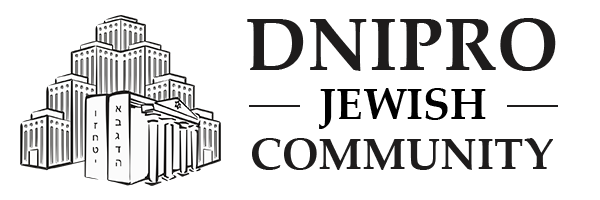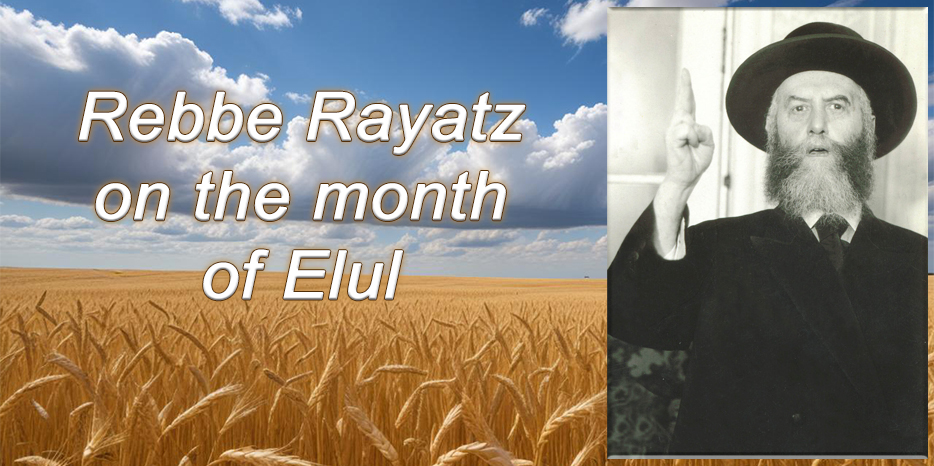The month of Elul is a special month in the Jewish calendar, a month of preparation for the Days of Judgment, a month very often called the month of teshuvah. The founder of Chabad Chassidism, the Alter Rebbe, taught that during this time of year the Almighty is like a king in the field who has left his palace, stepped outside the city walls, so there would be no barriers, so that anyone who wishes to approach him could do so.
The theme of the month of Elul has often been discussed by many sages and spiritual leaders. Today we offer our website readers an exposition of a maamar by the Rayatz Rebbe, the Sixth Lubavitcher Rebbe Yosef Yitzchak Schneersohn. This text was first published in the journal “HaKriah VeHaKedushah,” which was published in the USA from 1940–1945.
THE MONTH OF ELUL
Yosef Yitzchak Schneersohn
Elul is the final month of the Jewish calendar. It is a time for reckoning the passing year, introspection, and making positive resolutions for the coming year. The very name of the month is the subject of numerous interpretations that reveal the inner meaning of this fateful period leading up to Rosh HaShanah. One such interpretation views “Elul” as an acronym for the verse from Shir HaShirim (Song of Songs 6:3): “Ani l’dodi v’dodi li” (“I am my Beloved’s, and my Beloved is mine”).
The “I” refers to Knesset Yisrael, the collective soul of the Jewish people (whose sparks are all Jewish souls; Tanya, Part I, ch. 37). Addressing the Almighty, she calls Him “my Beloved,” because love for the Almighty burns in the heart of every Jew without exception—simply because they are Jewish (Tanya, ch. 18, pp. 23b–24b). “I belong solely to the Almighty,” declares Knesset Yisrael, “and He is mine alone.”
Earlier in Shir HaShirim (2:16), the same idea is expressed slightly differently (with the word order changed): “Dodi li va’ani lo” (“My Beloved is mine, and I am His”). Rashi explains: Everything the Almighty desired, He commanded the Jewish people to do—to offer the Passover sacrifice, bring the first fruits of the finest harvest to the Temple, build the Mishkan and the Temple, and serve Him there… All His demands were directed specifically to the Jewish people, not to the nations of the world. And everything Knesset Yisrael needs, she wishes to receive only from the One Almighty, not from anyone else.
The question arises: What does the first version—the one that forms the acronym for Elul—add to this? The essence of both verses is the same! So what distinguishes these similar verses?
The answer lies in the two modes of divine service among Jews. One is the path of the tzaddikim—righteous individuals who strive to fulfill the Almighty’s will as precisely and perfectly as possible. The other is the path of baalei teshuvah—those who have erred, violated Torah prohibitions, but repented and returned to a truly Jewish way of life. These two modes of service are expressed in the two verses from Shir HaShirim. “Dodi li va’ani lo” (“My Beloved is mine, and I am His”) reflects the service of the tzaddikim, who deeply understand what the Almighty expects of Knesset Yisrael—both the commandments and the prohibitions—and strive to fulfill them in the best way possible. They diligently study Torah, refine their character, and consistently act with integrity toward others. Therefore, they turn to the Almighty for all their needs and wish to receive only from Him.
A vivid example of such a life is Rabbi Zusha of Anipoli (the Jewish name for Annopol, Ukraine). While he was in Mezritch studying with his teacher and Rebbe, Rabbi Dov Ber, the Maggid, his family survived on the small amount of flour and vegetables he had left them. Upon returning, Rabbi Zusha saw how starved his family was, went out into the field, and cried out to the Almighty: “Master of the World! Zusha and his family want to eat!” On his way back, he noticed a freshly dug pit full of coins. Rabbi Zusha took a few coins and left the rest, covering them with earth. He bought flour and vegetables to last his family for a while, provided for them, and then returned to his sacred service of the Almighty.
This is the meaning of “Dodi li” (“My Beloved is mine”). The Almighty desires that Jews, by serving Him through Torah study and mitzvot, purify and sanctify the world, making it a “dwelling place” for the Creator. As the Alter Rebbe, Schneur Zalman, writes in Tanya (Part I, ch. 36): The Creator desired delight when Jews “transform darkness into light,” when they illuminate this material world—”the lowest of worlds”—with the light of Torah. Therefore, He Himself ensures that those who strive to fulfill His will lack nothing.
The other mode of service is that of baalei teshuvah, expressed in the verse “Ani l’dodi v’dodi li” (“I am my Beloved’s, and my Beloved is mine”). Its essence is that a person must motivate themselves toward teshuvah—to draw as close as possible to the Divine. This verse forms the acronym for Elul because this month is a time of reckoning and self-examination. During Elul, everyone must honestly and objectively evaluate their spiritual state in serving the Almighty, repent for misdeeds, and make positive resolutions for the future—to rectify past wrongs and henceforth do only good.
To deepen our understanding, let us recall a verse from Tehillim (25:8): “Good and upright is the Lord; therefore He shows sinners the way.” The Midrash comments (Midrash Tehillim 25:8): Why is the Almighty “good”? Because He is “upright.” Why is He “upright”? Because He is “good.” King David, the author of Tehillim, uses these words to highlight the difference between divine attributes and human qualities. In people, goodness and honesty do not necessarily coincide: a person may be kind but not honest, or honest but not kind. These qualities stem from different faculties of the soul. Honesty requires critical self-assessment, constant self-control, and often forcing oneself to do what one does not desire. Kindness, however, can be an innate trait, requiring little effort to express. (At times, one must even restrain kindness when reason dictates that showing it to the undeserving may cause more harm than good.)
Yet, in the Almighty, goodness and honesty are intrinsically linked: His kindness is just, and His justice is kind. Moreover, the Almighty’s goodness and honesty are fundamentally different from human qualities.
The Jerusalem Talmud (Makkot 2:6) relates an allegorical tale:
- Wisdom was asked: “What is the punishment for a sinner?” Wisdom replied: “Evil will pursue sinners.”
- Prophecy was asked: “What is the punishment for a sinner?” Prophecy answered: “The soul that sins shall die!”
- The Torah was asked: “What is the punishment for a sinner?” The Torah responded: “Let the sinner bring a guilt offering and be atoned.”
- Finally, the Almighty Himself was asked: “What is the punishment for a sinner?” The Holy One, blessed be He, answered: “Let the sinner repent, and he will be forgiven.”
This is why it is said: “Good and upright is the Lord; therefore He shows sinners the way.” The responses of Wisdom and Prophecy reflect strict justice—akin to human qualities where justice may not be tempered with kindness. In contrast, the responses of the Torah and the Almighty express heavenly, divine attributes, where kindness is justice and justice is kindness.
Upon closer examination, the Torah’s response is still more aligned with justice. According to the Torah, atonement is achieved through sacrifice—but sacrifices do not possess absolute atoning power. There are transgressions that sacrifices cannot rectify. If the sinner does not bring a sacrifice, they are subject to punishment—as per Wisdom and Prophecy. However, the Almighty’s response embodies pure kindness, absolute kindness, for teshuvah grants forgiveness for any sin. “Nothing can stand in the way of teshuvah” (Zohar, Bereishit, Midrash Ne’elam; Tanya, Part I, ch. 25, p. 31b).
Motivation for teshuvah comes in two forms:
- Divine Initiative: The Almighty Himself draws the Jew toward serving Him. “The Almighty has many messengers” (Rashi on Iyov 37:8)—numerous triggers and causes lead to teshuvah. It is said of the Almighty (II Shmuel 14:14): “He devises means so that the banished one may not be cast away from Him.” The Creator, blessed be He, gives a person every opportunity to follow the straight path of Torah and mitzvot. If they stray, He enables them to return and rectify their wrongs. The Almighty constantly seeks ways to save a Jew who has distanced themselves from the Jewish people and rejected their heritage.
Although the Almighty grants humans free will to choose their path—as stated in the Torah (Devarim 30:15): “See, I have set before you today life and good, death and evil”—He pities those who choose the wrong path and creates various situations to awaken their consciousness and prompt repentance. This might be a dream, a sudden memory of parents or ancestors, a seemingly chance word overheard, or an inner urge to break free from habitual patterns… Like a prick to the heart, this jolt shakes both body and soul, and the Jew realizes: “I am not living as I should!” They then resolve to completely change their life: sever ties with bad influences, break daily routines, put on tefillin, eat only kosher food, observe Shabbat, and if married, scrupulously follow the laws of family purity. This is the first form of motivation for teshuvah.
- Personal Initiative: The Jew awakens on their own and strives toward the Almighty. Note that this is not necessarily about repenting for a specific wrong—though people often associate teshuvahwith atoning for sins. The essence of teshuvah is the desire to become better, nobler, more elevated, and more spiritual. In this sense, even the most pious person, who diligently fulfills their duties to the Almighty, can engage in teshuvah. When one reflects on why the world was created, why they themselves were created, and the meaning and ultimate purpose of their life—if they reason impartially and sincerely seek truth—they inevitably conclude that true good lies in fulfilling the Creator’s will.
Now we better understand the difference between the two verses from Shir HaShirim. “Dodi li va’ani lo” (“My Beloved is mine, and I am His”) refers to the first form of motivation for teshuvah—that which is sent from Above by the Almighty Himself. The verse “Ani l’dodi v’dodi li” (“I am my Beloved’s, and my Beloved is mine”) refers to the second form: awakening within one’s own soul the desire to engage in divine service and self-improvement.
As noted, it is the latter verse that forms the acronym for Elul, because this month is the time to recall the events of the passing year and strive for teshuvah. Elul is the most suitable time for introspection and accounting: what was done over the past year, what was not done, what should not have been done, and what should have been done.
There is a verse in Tehillim (34:15): “Turn away from evil and do good; seek peace and pursue it.” The Baal Shem Tov taught that in every material phenomenon, even those permitted by the Torah, there is good and evil. The material aspect is evil, while the divine energy sustaining and animating it is good. Therefore, when using any material thing, one must “turn away from evil”—not prioritize the material aspect or seek pleasure from it. Instead, one should “do good”—focus on benefiting from the divine energy within it—and “seek peace and pursue it”: strive to reconcile the material and divine aspects, using physical objects solely according to the Almighty’s will, not personal interests. By doing so, one fulfills the purpose for which their soul was sent into this world: to purify, refine, and transform the world into a vessel for divine light.
Elul is the time to take stock of the entire year: How much “good” did I do? Did I always “turn away from evil” when necessary? Did I truly “seek peace” (the peace desired by the Almighty) and “pursue it”?
It is written in Tehillim (139:5): “You have formed me behind and before.” Our sages explain that humans were created at the very end of the Six Days of Creation—”behind” all other creations. Yet, it is also true that humans were created “before” all else, for the ultimate purpose of creation is humanity, and the divine thought of humans preceded all of creation. This is because humans are tasked with realizing the Almighty’s highest intention in creating the universe. When a person studies Torah, performs mitzvot, and treats others with kindness, they illuminate and elevate the world. However, when one neglects Torah study, mitzvot, and character refinement, it is said: “Even a mosquito precedes you” (Tosefta Sanhedrin, ch. 8; Midrash Bereishit Rabbah 8:1; Tanya, Part I, ch. 24, p. 30b)—even the most insignificant insect holds greater value than such a person.
Without Torah study, it is easy to violate the Almighty’s will—both by neglecting positive commandments and transgressing prohibitions. Those who do not study Torah constantly err out of ignorance. Due to their casual attitude toward mitzvot, unintentional violations can easily lead to deliberate ones.
Sadly, there are people who violate up to five divine prohibitions daily without realizing it. When confronted, they dismiss it: “What difference does it make?”
During the Temple era, the Torah advised sinners to bring a guilt offering and attain atonement—provided they accompanied it with teshuvah: genuine repentance and a firm commitment not to repeat the sin. Today, however, we have only the Almighty’s “advice”: to perform sincere teshuvah and thereby earn complete forgiveness. The month of Elul is the most favorable time for this, as it is the month of teshuvah. By designating it for this purpose, the Almighty desires that we arrive at Rosh HaShanah refined, purified from past sins, and meriting a good inscription and divine seal for a good and sweet year—in both material and spiritual matters—within the community of all Israel.




